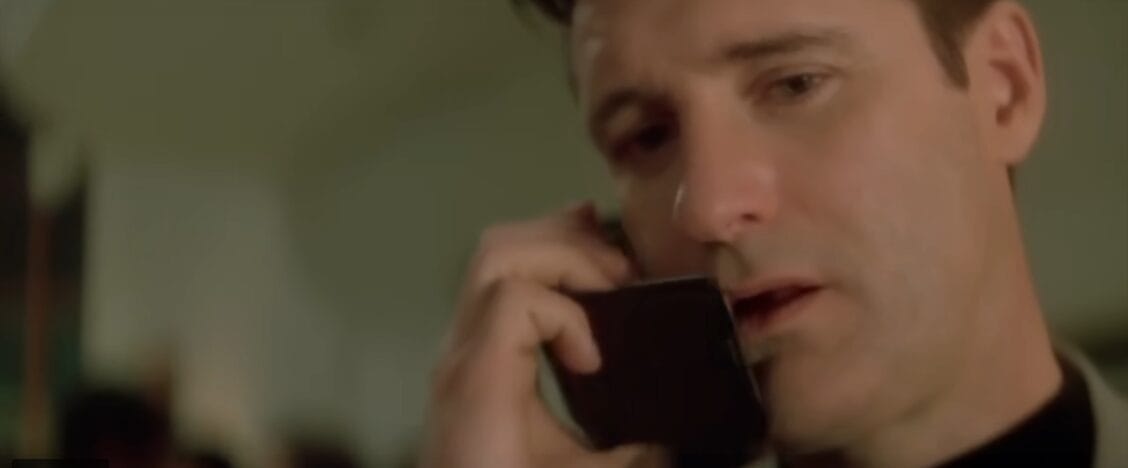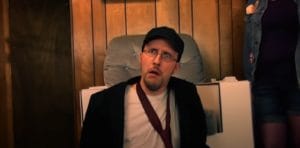By RS Benedict
Lost Highway isn’t most people’s favorite David Lynch movie. It bears Lynch’s signatures—doppelgangers, dreams, road trips, Americana—but it’s not as quirky as Twin Peaks, not as surreal as Eraserhead, not as twisted as Blue Velvet, not as warm as The Elephant Man, and not as gay as Mulholland Drive. Lost Highway is cold brutality from start to finish, with no one to root for and no one to love. Like a Möbius strip, like an ouroboros, the film ends where it begins, a story with no resolution, a ride with no destination.
The film’s great strength lies in how it captures the uneasy mood—the cursed vibes, as the kids used to say—of the late 1990s. Cell phones, camcorders, intercoms, and VHS tapes play pivotal roles in the story, intruding upon the protagonist’s life and shattering his reality. At the time, these technologies were becoming more common, in the process reshaping American culture by promoting communication at the expense of privacy.
The relative accessibility of VHS pornography (compared to the hassle of setting up a film projector or going to a grimy theater) brought an obsession with porn culture into the mainstream. With camcorders cheaper and lighter than the bulky models of the 1980s, many couples started making their own spicy home movies for private viewing. Just two years before Lost Highway hit theaters, an electrician stole a home video from Pamela Anderson and Tommy Lee’s home in Malibu. The thief made copies of it and sold them on the internet, in the process creating the first viral celebrity sex tape. It’s hard not to think of them when the film’s ostensible hero starts receiving unmarked VHS tapes showing an unknown videographer invading his bedroom.
But beyond the now-dated technology, what Lost Highway best captures is the existential horror of the so-called End of History. The expression, coined by political scientist Francis Fukuyama, refers to the post-Soviet era. Fukuyama argued that history should be viewed as a struggle between ideologies, and now that the greatest one—liberal democracy—had triumphed over monarchism, fascism, and communism, human civilization had reached its happy ending. There could be no more heroic struggle, no more worlds to conquer. We were done. And as the new millennium yawned, Americans looked and saw a thousand more years of the same stretching out in front of them, and asked, with dread, “Is that all there is?”
Films from this period show a spiritual ennui among civilization’s supposed winners. Fight Club, American Beauty, Falling Down, Groundhog Day, American Psycho, Office Space, and arguably The Matrix all portray white collar white men facing a crisis of meaning and the extreme lengths they will go to in the hopes of finding something more. Surely, life must have something beyond shopping malls and IKEA furniture. Surely, this ride is going somewhere.
Doppelganger
Lynch rarely explained what his films were about, preferring to allow the audience to make their own interpretations. But he was unusually forthcoming about Lost Highway. In Catching the Big Fish: Meditation, Consciousness, and Creativity, he wrote, “At the time Barry Gifford and I were writing the script for Lost Highway, I was sort of obsessed with the O.J. Simpson trial. Barry and I never talked about it this way, but I think the film is somehow related to that… What struck me about O.J. Simpson was that he was able to smile and laugh. He was able to go golfing with seemingly very few problems about the whole thing. I wondered how, if a person did these deeds, he could go on living. And we found this great psychology term—‘psychogenic fugue’—describing an event where the mind tricks itself to escape some horror. So, in a way, Lost Highway is about that. And the fact that nothing can stay hidden forever.”
The most common interpretation of Lost Highway goes like this: an aging jazz musician named Fred (Bill Pullman) is locked up for the murder of his cheating wife Renee (Patricia Arquette). Fred burrows into denial so deep it literally transforms him into 24 year-old Pete Dayton (Balthazar Getty), freeing him from legal and moral responsibility for his crime. But reality, represented by a video camera wielded by the creepy Mystery Man (played by Robert Blake, who was later accused of murdering his wife in real life), keeps intruding on Pete’s life. Unable to maintain his illusory existence, Pete turns back into Fred, claims responsibility for the murder of Renee’s lover Dick Laurent, and, after having a brief word with himself, takes off in his car, pursued by the police. As the film ends, Fred begins to transform again—perhaps into a new fantasy, or perhaps Fred was also an illusion dreamed up by another man, one more layer in a Russian doll.
Pete embodies what Fred wishes he had. Unlike Fred, Pete is young and sexy and hip, a rockabilly king who dresses like the Fonz. Pete’s friends love him. His parents (who also dress like the Fonz) approve of him. His coworkers respect his extraordinary talent. The detectives trailing him admire his sexual prowess. Women want him. He can maintain an erection. (Unfortunately for Fred, Viagra did not hit the market until 1998, a year after Lost Highway came out.) Pete even has the ultimate aspirational white boomer accessory: a Black friend, played by Richard Pryor, to praise him.
But as an escapist fantasy, Pete’s life is still kind of pathetic. His 1950s greaser style is hopelessly uncool for 1997, when the rest of the culture was shifting from retro 1960s hippie to the futuristic Y2K aesthetic later typified by Destiny’s Child, pre-tradcath Gwen Stefani, and Toxic-era Britney Spears. Pete still lives with his parents and sleeps in a twin bed. Pete’s social life mainly consists of getting drunk at a bowling alley. His sexual escapades are strictly vanilla, and largely missionary. The one time he has sex with the woman on top, he loses control over his partner and suffers spiritual emasculation. He is aghast at the existence of VHS porn, queasy at the notion of doggystyle sex.
The jazz that permeates Pete’s life is not the sophisticated cultural signifier it used to be in the 1970s; by the late 1990s, the genre was overwhelmingly dad-coded. A truly cool 1997 Pete would be wearing JNCOs and listening to “Smack My Bitch Up” by The Prodigy. Notably, throughout the film, then-contemporary music like Rammstein or Nine Inch Nails or Marilyn Manson usually appears during moments of horror and despair, gesturing at Fred’s fear of youth culture.
In other words, Pete does not represent a new beginning, but the retrograde fantasy of an aging, out-of-touch man. It’s what a hopelessly uncool baby boomer thinks is cool, a pitiful midlife crisis made flesh. It’s not enough to sustain a man.
And so, when gangster Mr. Eddy (Robert Loggia) rolls up to embody Fred’s negative qualities—aging, control issues, violence—of course Pete joins him for a ride, during which time he gets to vicariously live out the American boomer dream of brutalizing another motorist for a petty traffic violation. And when Mr. Eddy’s girlfriend Alice (played, again, by Patricia Arquette, this time as a classic Hollywood blonde against the Bettie Page-banged Renee) throws herself at Pete, of course he reciprocates, because Pete’s devoted girlfriend Sheila (who, again, dresses like the Fonz) is not good enough, because even in his escapist fantasies Fred cannot imagine himself in a healthy relationship with a woman.
Around that time, baby boomers were having their own identity crisis. The twentieth century—their century—was coming to a close, and the generation that sang “I hope I die before I get old” was hitting its fifth decade. They were no longer young, no longer hip, no longer important, and unlike their parents who survived the Great Depression and defeated Hitler, or their grandparents who endured the First World War and invented Dadaism, the boomers could only claim the twin failures of the Vietnam War and the unsuccessful protests against it, a series of unfinished social justice movements that its most prominent members actively sought to suppress by the 90s, and some admittedly very good rock music that was now used in television commercials for soda pop, blue jeans, and Big Macs. It was a generation past its prime, and its prime was never really that great. Like Fred.
And instead of looking forward, confronting themselves, and coming to terms with reality, the generation—in particular the pale, male segment of it—regressed into an anachronistic fantasy of eternal youth. It was not enough. So when a cruel, rich old gangster rolled up and said, I will make you great again, of course they let him take them for a ride. Like Fred.
Dick Laurent is dead
Briefly, near the end, as his fantasy falls apart, Fred comes face to face with himself. The elaborate QAnon-style conspiracy theory of spies and detectives and human trafficking rings leads to a dead end, and the coveted female object leaves once again. “You’ll never have me,” Alice says, because the problem was never the external threat of sickos like Andy and Mr. Eddy. The problem is Paul, and it always has been. His feminine ideal, the set of contradictory things he needs a woman to be, cannot exist in the real world.
When the Mystery Man delivers the truth through the blunt medium of low-res video, there’s a sliver of hope that Paul might become better somehow. He faces reality, that there was no Alice, only Renee, and there was no gangster Mr. Eddy, only Dick Laurent (also played by Robert Loggia), a sleazy old man Renee was sleeping with of her own free will.
But this glimmer of self-reflection ends, again, in violence. Paul carries out another murder, this time fully aware of who he is and what he’s doing, and the Mystery Man assists after Paul nearly gets beat up by a wounded senior citizen. Technology does not curb Paul’s violent impulses; it enables them, like boomers driven mad by the information age, screaming about sexual deviants trying to steal “their” women and children, sharing AI-generated images of large breasted soldiers next to soda bottle Jesus, fantasizing about high-tech “med beds” that will grant them eternal youth, holding desperately onto political and economic power instead of passing the torch to the next generation.
The term fugue, as in psychogenic fugue, Lynch’s description of Lost Highway, carries a double meaning. In psychology, it refers to a dissociative mental state. But in music, a fugue is a type of composition where one or two themes are repeated, echoed by different voices and woven together. This is the structure of Lost Highway, where actors play multiple characters, where Fred duplicates himself in Pete and makes the same mistakes over and over again.
It’s also where we are as a society after the End of History, stuck in the backseat as an increasingly unhinged gerontocracy drives us around in circles, feeding their dated self-aggrandizing illusion with violence against imaginary deviants, a blood-drenched Möbius strip, a ride going nowhere down a lost highway.





